|
|
|
Sort Order |
|
|
|
Items / Page
|
|
|
|
|
|
|
| Srl | Item |
| 1 |
ID:
120295
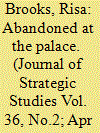

|
|
|
|
|
| Publication |
2013.
|
| Summary/Abstract |
Many analysts have focused on the Tunisian protests and the economic and political grievances that fueled them. Equally central, however, was the role played by the military leadership and the decision to forgo using force to actively suppress the protesters. Contrary to arguments that stress the reflexively apolitical or professional nature of the military, or its leaders' normative commitment to supporting the protesters, this article explains how the decisions made reflected political calculations and served the military's organizational interests. Although heralded as the savior of the revolution, the Tunisian military acted out of its own organizational self-interest in defecting from the Ben Ali regime.
|
|
|
|
|
|
|
|
|
|
|
|
|
|
|
|
| 2 |
ID:
080511
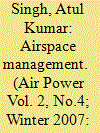

|
|
|
| 3 |
ID:
133411
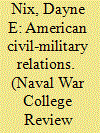

|
|
|
|
|
| Publication |
2012.
|
| Summary/Abstract |
Samuel P. Huntington died in December 2008, but this Harvard academic continues to have a significant impact on the conduct and state of American civil-military relations. Mackubin Owens's recent US Civil-Military Relations after 9/11: Renegotiating the Civil-Military Bargain and Suzanne Nielsen and Don M. Snider's 2009 edited work American Civil-Military Relations: The Soldier and the State in a New Era both challenge and contextualize Huntington's work for contemporary theorists and practitioners of civil-military relations. This is indeed a worthwhile effort, as America's civil-military relations have received much "airtime" over the past few years. General Stanley McChrystal's seeming challenge to the political leadership over proposed Afghanistan troop levels, Lieutenant Colonel Andrew Milburn's Joint Force Quarterly article challenging traditional conceptions of civilian control, and Bob Woodward's revelations in Obama's War regarding the 2009 tensions between the Pentagon and the administration over Afghanistan strategy highlight the relationship between the military and our civilian leaders while raising the issue of the military's participation in political discourse.
|
|
|
|
|
|
|
|
|
|
|
|
|
|
|
|
| 4 |
ID:
190779
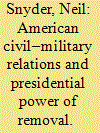

|
|
|
|
|
| Summary/Abstract |
Under what conditions are presidents more likely to remove senior defense officials from office? Using a novel data set of all senior U.S. defense officials, both civilian and uniformed military from 1947 to 2021, this article explores whether anticipated support in Congress, partisan factors, or institutional protections for the military affect observed patterns of removal for defense officials. The results suggest that presidents are more likely to remove their own appointees (or their co-partisans’ appointees), but provide little evidence that presidents premise removal on anticipated partisan support for a replacement nominee in Congress. Moreover, the results suggest that military officials may have some insulation from politicization by strong forms of removal, though that protection may weaken an important aspect of civilian control of the military, the threat of punishment by removal, raising profound questions for how civilian control endures.
|
|
|
|
|
|
|
|
|
|
|
|
|
|
|
|
| 5 |
ID:
007320
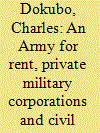

|
|
|
|
|
| Publication |
Summer 2000.
|
| Description |
51-64
|
|
|
|
|
|
|
|
|
|
|
|
|
|
|
|
| 6 |
ID:
062050
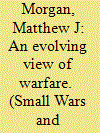

|
|
|
| 7 |
ID:
001856
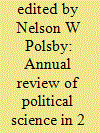

|
|
|
|
|
| Publication |
California, Annual Reviews, 1998.
|
| Description |
xx,477p.
|
| Standard Number |
0-8243-3301-2
|
|
|
|
|
|
|
|
|
|
|
|
Copies: C:2/I:0,R:0,Q:0
Circulation
| Accession# | Call# | Current Location | Status | Policy | Location |
| 042848 | 320.05/POL;1-2 042848 | Main | On Shelf | General | |
| 042849 | 320.05/POL;1-2 042849 | Main | On Shelf | General | |
|
|
|
|
| 8 |
ID:
132632
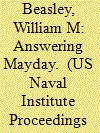

|
|
|
|
|
| Publication |
2014.
|
| Summary/Abstract |
Following the outbreak of World War I, President Woodrow Wilson explained his policy: "A powerful Navy we have always regarded as our proper and natural means of defence…. We shall take leave to be strong upon the seas, in the future as in the past; and there will be no thought of offence or provocation in that. Our ships are our natural bulwarks. Today, our natural bulwarks are crumbling. Seth Cropsey's 2013 book Mayday: the decline of American Naval Supremacy warns that if left unaltered, current defence cuts and procurement policy will destroy the global presence of the US navy.
|
|
|
|
|
|
|
|
|
|
|
|
|
|
|
|
| 9 |
ID:
117620


|
|
|
|
|
| Publication |
2012.
|
| Summary/Abstract |
Since late 2010, an unprecedented wave of protests demanding greater political freedoms, and in several countries even regime change, has swept across much of the Arab world. In Tunisia, Egypt, and Libya, long-standing autocrats have been toppled, and in other countries of the region seemingly well-established authoritarian regimes also appeared increasingly shaky in the face of growing opposition movements. The aim of this article is to examine the role of the armed forces in these popular uprisings. While military forces have been key actors in these Arab uprisings, they have responded quite differently across the region to prodemocracy movements, ranging from openness to protest movements, to internal fracturing, to firm support for the regime in power. This article argues that these differences can be explained with reference to different forms of civil-military relations and different characteristics of the military apparatus. It claims in particular that the degree of institutionalization of the armed forces and their relationship to society at large can account for the divergent responses to pro-reform movements.
|
|
|
|
|
|
|
|
|
|
|
|
|
|
|
|
| 10 |
ID:
133428
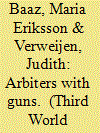

|
|
|
|
|
| Publication |
2014.
|
| Summary/Abstract |
Based on extensive field research in the Democratic Republic of the Congo (DR Congo), this article elucidates the logics, processes and readings surrounding certain 'extra-military' practices enacted by the Congolese army, namely the processing of various types of disputes between civilians. Exceeding the boundaries of the domain of 'public security', such activities are commonly categorised as 'corruption'. Yet such labelling, founded on a supposed clear-cut public-private divide, obscures the underlying processes and logics, in particular the fact that these practices are located on a blurred public-private spectrum and result from both civilian demand and military imposition. Furthermore, popular readings of military involvement in civilian disputes are highly ambiguous, simultaneously representing it as 'abnormal' and 'harmful', and normalising it as 'making sense' - reflecting the militarised institutional environment and the weakness of civilian authorities in the eastern DR Congo. Strengthening these authorities will be vital for reducing this practice, which has an enkindling effect on the dynamics of conflict and violence.
|
|
|
|
|
|
|
|
|
|
|
|
|
|
|
|
| 11 |
ID:
044465
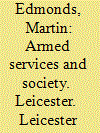

|
|
|
|
|
| Publication |
Leicester, Leicester University Press, 1988.
|
| Description |
xi, 226p.
|
| Standard Number |
0718512669
|
|
|
|
|
|
|
|
|
|
|
|
Copies: C:1/I:0,R:0,Q:0
Circulation
| Accession# | Call# | Current Location | Status | Policy | Location |
| 030338 | 306.27/EDM 030338 | Main | On Shelf | General | |
|
|
|
|
| 12 |
ID:
079019
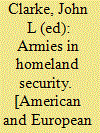

|
|
|
|
|
| Publication |
Washington, DC, National Defense University Press, 2006.
|
| Description |
viii, 251p.
|
| Standard Number |
0160768128
|
|
|
|
|
|
|
|
|
|
|
|
Copies: C:1/I:0,R:0,Q:0
Circulation
| Accession# | Call# | Current Location | Status | Policy | Location |
| 052427 | 363.347094/CLA 052427 | Main | On Shelf | General | |
|
|
|
|
| 13 |
ID:
015398
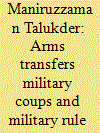

|
|
|
|
|
| Publication |
Dec 1992.
|
| Description |
733-755
|
|
|
|
|
|
|
|
|
|
|
|
|
|
|
|
| 14 |
ID:
098363
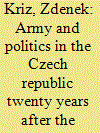

|
|
|
|
|
| Publication |
2010.
|
| Summary/Abstract |
This article focuses on relations between army and politics in the Czech Republic after the 1989 Velvet Revolution. This article concludes that these relations in the Czech Republic achieved the parameters typical of consolidated democracies. The many problems that continue to exist in this area in the Czech Republic do not in any significant way deviate from what is typical of consolidated democracies. Therefore, the transformation of civil -military relations can be regarded as successful.
|
|
|
|
|
|
|
|
|
|
|
|
|
|
|
|
| 15 |
ID:
124524
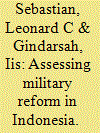

|
|
|
|
|
| Publication |
2013.
|
| Summary/Abstract |
This article seeks to assess the magnitude of military reform in Indonesia and its impact in establishing greater levels of professionalism within the armed forces. To this end, the authors will offer some reflections on the studies of civil-military relations and military transformation for inculcating a higher degree of military professionalism; analyse to what extent the process of military reform in Indonesia has reshaped the institutional role of the armed forces; and discern three major strategic gaps in Indonesia's military reform, namely the "legal loopholes and regulation vacuum," the "shortcomings of democratic civilian control," and the "defence-economic gap." This article asserts that military professionalism will grow more substantially depending on the ability of civilian elites to exercise effective control over the military and the capacity of the government to transform the military establishment keeping pace with strategic challenges and operational requirements.
|
|
|
|
|
|
|
|
|
|
|
|
|
|
|
|
| 16 |
ID:
119058
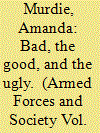

|
|
|
|
|
| Publication |
2013.
|
| Summary/Abstract |
Does civil-military conflict harm military effectiveness? Most previous empirical literature on the effects of civil-military conflict has utilized dichotomous indicators of the presence or absence of overall civilian control. However, the extant theoretical literature is clear that mid-levels of civil-military conflict could be good for innovation and overall decision making. In line with these arguments, the author argues that we should not expect all civil-military conflict to harm military effectiveness and, by extension, international crisis bargaining outcome. Instead, some civil-military conflict should have a positive effect on the overall success of the military. Utilizing new events data that captures the level of civil-military conflict cross nationally from 1990 to 2004, the author examines how civil-military conflict actually has an inverse U-shaped relationship with crisis success. This project also adds to the theoretical literature by examining variations across different degrees of civil-military conflicts, drawing attention to the usefulness of mid-range civil-military "friction."
|
|
|
|
|
|
|
|
|
|
|
|
|
|
|
|
| 17 |
ID:
193056
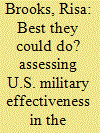

|
|
|
|
|
| Summary/Abstract |
This article explores shortcomings in military effectiveness in the war in Afghanistan. It focuses on three sets of problems: the failure to resolve internal contradictions in the training effort, the failure to integrate political considerations with military activity, and poor strategic and operational/tactical integration.
|
|
|
|
|
|
|
|
|
|
|
|
|
|
|
|
| 18 |
ID:
120301
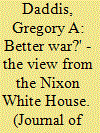

|
|
|
|
|
| Publication |
2013.
|
| Summary/Abstract |
This article examines the relationship between the White House and the US Military Assistance Command, Vietnam (MACV) during President Richard M. Nixon's administration. It argues that dysfunctional civil-military relations between 1969 and 1972 undermined the implementation of a sound military strategy during the United States' withdrawal from South Vietnam as Nixon attempted to achieve 'peace with honor' during the Vietnam War's final campaigns. By 1972, the relationship between the White House and MACV headquarters had reached the nadir of civil-military relations during the Southeast Asian conflict and had served to undercut the United States' ability to effectively disengage from a long and bitterly contested war.
|
|
|
|
|
|
|
|
|
|
|
|
|
|
|
|
| 19 |
ID:
083038
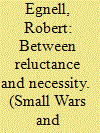

|
|
|
|
|
| Publication |
2008.
|
| Summary/Abstract |
The civil-military interface in peace support operations is changing due to increasingly overlapping tasks, increased military involvement in humanitarian activities, and increased integration of all involved actors, not least through various current strategic concepts. This article not only describes these trends, but also, more importantly, analyses certain consequences in terms of mission effectiveness. The focus of the analysis is the ideas of 'militarisation of humanitarian aid' and the reverse 'humanitarianisation of the military'. The main arguments of this contribution are that the assumptions of increased effectiveness stemming from civil-military integration cannot be taken for granted and that there are harmful consequences stemming from blurring the lines between civilian, humanitarian and military actors. There is, in other words, a need to better specify and explain the causal mechanisms that lead to effectiveness in complex peace support operations.
|
|
|
|
|
|
|
|
|
|
|
|
|
|
|
|
| 20 |
ID:
098366
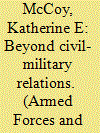

|
|
|
|
|
| Publication |
2010.
|
| Summary/Abstract |
This article applies the problem of civilian control over the military to the realm of private military contractors. The author argues that military outsourcing strips the principal -agent relationship of many of the structures and dynamics that states have traditionally used to control militaries. Many of the same qualities that make private military corporations successful as both economic actors and political surrogates also lead to reductions in the possibility for effective civilian control. The author supports these claims through an examination of the multilevel, fragmented, and global nature of the private military corporation market, with particular attention to divisions within the labor force. The implications of this analysis are that using private military corporations raises persistent challenges and tensions for effective state control that cannot be easily regulated away.
|
|
|
|
|
|
|
|
|
|
|
|
|
|
|
|
|
|
|
|
|